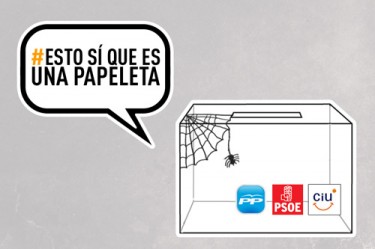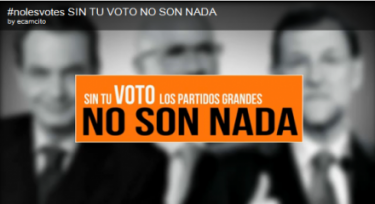This post is part of our special coverage Europe in Crisis.
The general elections campaign that will be held this Sunday in Spain has an entirely different version online. The digital anti-campaign, propelled by the 15-M movement, is hyperactive and rapidly spreading through social networks. Although it is directed toward all voters, it can have an impact on the undecided and those who lean towards expressing their dissatisfaction and anger through non-participation.
Although the predominant mindset in the country is that everything is already decided — polls reveal the defeat of the governing PSOE (Spanish Socialist Workers’ Party) and give absolute majority to the PP (People's Party) — Internet users are promoting reflection, and a responsible, well-informed vote in a heated debate against the clock. Their slogan advocates participation through the selection of minority options to break the bipartisan system and the consolidated power shared by socialists and populists during the past decades. They remind us that abstention does not count and blank votes are detrimental to small political groups.
Journalist and blogger Mónica Solanas summarized this feeling a few days ago in a tweet [es]:
@monicontomate: Todavía nos queda una semana para dar un vuelco a lo que parece inevitable. Podemos hacerlo. Debemos hacerlo. #PPSOE #nolesvotes #votaaotros
Other Twitter users express themselves as follows [es]:
@CarlosCAlvarez: Votar en blanco es como votar PP y PSOE, porque pone más alto el listón para los partidos pequeños #20N#reinicia
@ bufetalmeida:Votar a quien recorta libertades y derechos no saca de la crisis, solo recorta libertades y derechos #nolesvotes #votaaotros #aritmetica20n
@ivanbreve: Tinc dues opcions per votar. Per suposat que no es el #ppsoe. Decidiré el mateix #20N
@AiTask: Mi hijo de 5 años me pregunta qué habrá en la Tierra cuando nos extingamos como los dinosaurios. Le he dicho: políticos y banqueros. #2oN
Ateneapensativa: Lo bueno es que después de las elecciones nos quedarán 4 años para seguir peleando por una democracia real ya @DRYmadrid ;)
Countless initiatives are discussed online under hashtags #20N (#Nov20), #PPSOE, #nolesvotes (#donotvoteforthem) or #votaaotros (#voteforothers), that add up and place counter-campaigners on top, including those who promote protests and actions on the streets in defense of public education (#forthepublic [es]) or against the eviction of citizens who cannot pay their mortgages (#stopevictions [es]).
Real Democracy Now (DRY) [es], the platform that sparked the first protest on May 15, is one of the most active and has made its position clear [es]:
Democracia Real Ya no anima a la abstención, al voto nulo, al voto en blanco ni al voto a ningún partido en concreto, animamos a la elección informada y en conciencia. La opción más eficaz para debilitar a los partidos mayoritarios es el voto a otros, aunque se puede interpretar como la aceptación del sistema de votación.
Op20N [es] defends a similar stance that anonymous people have put forth, much like Do not vote for them [es], a very active initiative online that rose in February to denounce the Sustainable Economy Act (Sinde Act), and encourages others to not vote for any of the main three parties in the Parliament, adding the nationalist Catalan party CiU (Convergència i Unió) to that list, in addition to the PP and PSOE. Its page has already attracted more than 4,680,000 unique followers:
No te pedimos el voto por ningún partido o ideología en concreto, sino que te informes para comprobar si existen alternativas políticas que quizás representan mejor tus ideas, y lo que los ciudadanos concebimos como democracia. La democracia no son los grandes partidos: la democracia eres tú, y millones como tú. Sin tu voto no son nada. En las próximas elecciones, NO LES VOTES.
The platform links to blog AritmEtica20N [es], which calculates which minority parties have more options to be selected in each district and suggests not voting according to color or programs, but rather an objective to complete: “Make the PP, PSOE and CiU monopoly collapse and stop the PP from governing by absolute majority.”
The DRY anti-elections campaign is quite versatile: they have done everything from creating educational tools [es] to making voters conscious and explaining how the seat distribution functions according to the D'Hondt system that Spain uses, to massive actions of protest like the so-called DoriYakiTu [es] operation, which, under its exotic name, proposes that voters present a complaint to the polling stations to show discontent between the voting system and the vote count, which is considered “unjust and disproportionate,” given that it penalizes minority representation.
The portal Socvot [es] (that derives its name from Social Vote but also means I am the vote in Catalán) also aims to shed a bit of light on the system and inform voters about available options. It also demonstrates how Congress would be divided if it were a “single district” on Twitter or Facebook, allocating seats based on the number of followers that each party had on the two social networks.

Other platforms center on political corruption, such as País corrupto [es], that compiled a map fo Spain showing the cases of corruption in which the parties are implicated, or Huele a Corrupto [es], an aggregator of sorts for news, blogs and comments on social networks that include the terms “corrupt” or “corruption.”
Here is a YouTube video that uses Pink Floyd's “Money” to show Congressional and Senatorial candidates who were charged, investigated, or presumably involved in cases of abuse of power:








3 comments